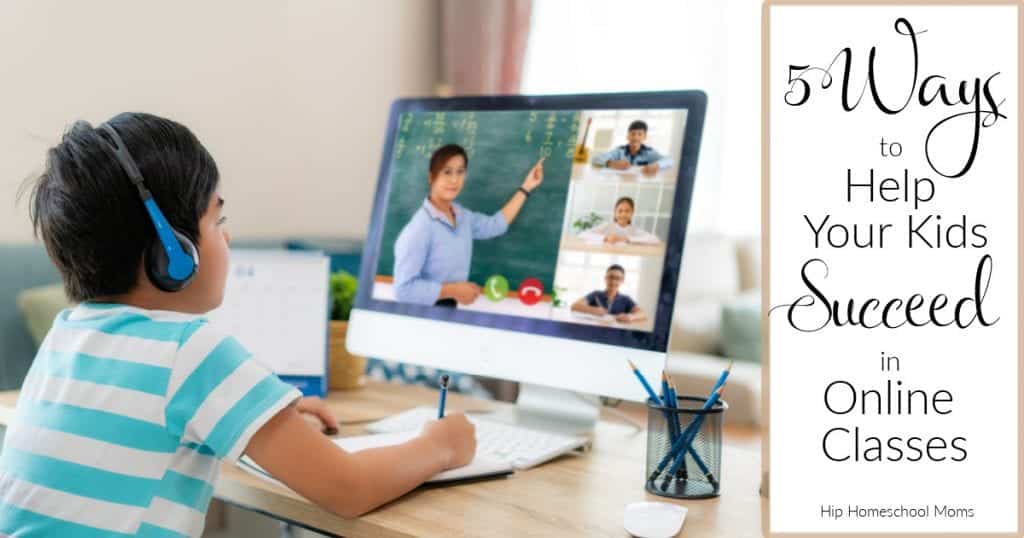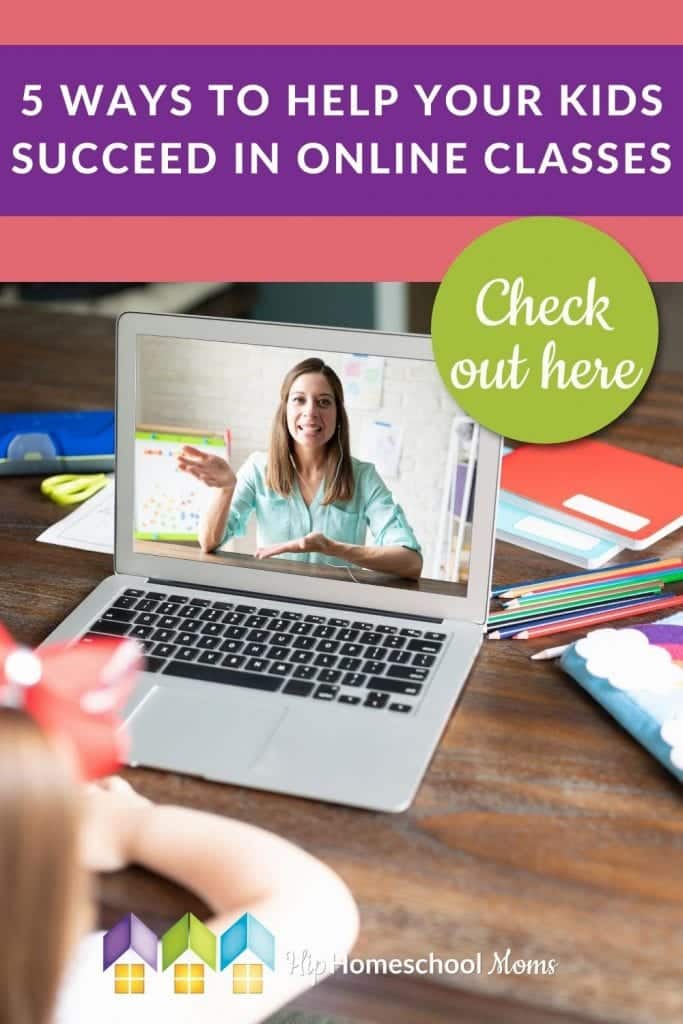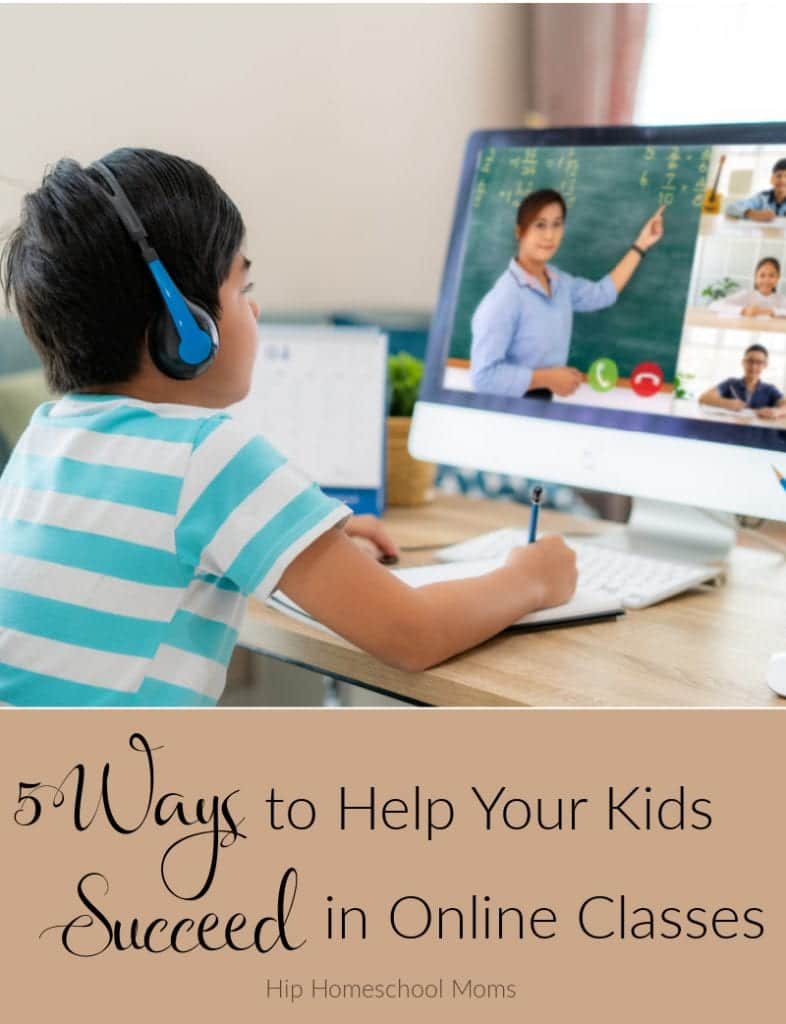5 Ways to Help Your Kids Succeed in Online Classes
Homeschooling allows us to blend our resources, curriculum, and even instructional options! If you’re reading this article, I’ll bet that you have one (or more) children taking one (or more) online classes. Online classes can be great for a number of circumstances. Many homeschooling parents appreciate online instruction because it’s a portable means of consistent instruction. As such, it can particularly be a handy resource for a family that travels a lot or that has two parents who work full-time. A lot of parents appreciate online instructors who can walk their kids through a subject that doesn’t come naturally (either to the student or the parent). And, in more recent years, electives and extracurricular activities have also gone virtual, allowing at-home students to connect with other students and instructors who have more specialized skills to share.
As parents, however, we still want to support and encourage our children to do their best, even if the (full) responsibility of teaching isn’t directly in our hands. We still want to be there to supplement our children’s education and help them be successful! If this sounds familiar, here are 5 simple things you can do to help your child succeed with online classes.

Practical Ways to Help Your Child Succeed in Online Classes
1. Set a routine.
As important as consistency is for adults, it’s even more so for kids. Therefore, one thing you can do as a parent to help your children succeed in online classes is to help them build and maintain a routine around those online classes. I don’t only mean consistently scheduling online classes for the same time of day or days of week (though if that’s within your power, certainly do that). I also mean that it’s a good idea to help your children figure out what things need to be done before they even log onto the online class. This won’t necessarily look the same for every child. A lot of what is going to set the best routine depends on the individual child, which is where you can come in and help!
For example:
12-year-old Samantha pays the best attention in her online class if she’s recently eaten a snack and had the chance to “work out her wiggles” by running around the yard a little bit first. She also tends to fidget and get distracted. Therefore, Samantha and her mother create a routine in which Samantha has a snack and gets in some exercise before her scheduled online session. She’ll also plan to keep a fidget tool at hand to help her concentrate.
You get the idea, right? Trouble shoot what specific things will help your children get in a good, successful routine for online classes, and help them establish it!
2. Help your children be prepared.
This one is important in any school setting (public, private, homeschool online). Being prepared is also important in the school of life, so why not start working on it now? When you are helping your children establish the most effective routines for online coursework, a part of that should always involve taking time to be prepared.
This involves factors such as planning to be on time, having materials ready and homework completed, being dressed for class (at least from the top up– no one can see the pajama pants!), and having a good attitude. Teaching your children study skills is also an excellent way to way to help them be prepared for online class time. If you’re not sure how to get started teaching study skills, check out our article on the topic: Helping Your Children Develop Good Study Skills.
3. Teach your children time management.
In helping your children establish a work-conducive routine and learn how to be prepared, another handy skill to start working with them on is time management. It’s one thing to try to have a good, established routine and have everything prepared for class, but if you don’t include time management into the mix…then the class might be over by the time everything’s ready! (You know it’s true!)
A good basic first step would to get each child a planner and demonstrate how to use it. Encourage your children to use the planner every day and make it into a habit. Here are a few things you may want to encourage them to designate on the planner when first starting out:
- Mark out larger sections/chunks of homework time, class time and recreational time in different colors.
- Pencil in meal times (and meal plans, if your child is involved with that facet of life).
- Write down important class deadlines and set some smaller goals leading up to the final deadline.
Depending on each child’s age and willingness to keep updating the planner, you may want to check it daily or weekly to help them stay consistent and offer feedback about the types of events that may need to be recorded in there. Once it becomes a habit, you will probably have to check less often (or not at all).
Another tip is to teach your children to mark holidays, family vacations, or any other days (such as family birthdays or play dates, etc.) that you know you won’t be doing school. This allows your children to see which days they won’t be available to work on assignments and study for tests. It’s also important for them to learn to schedule time to work on on-going projects and to study for tests over the number of days it will take to complete each project or to study for the test.
For example:
14-year-old Johnathan needs to complete a science project that is due next week on Thursday. He’ll need at least two days and possibly three to get it done. Tuesday of next week he has guitar lessons and then gets together to play basketball with friends, so he’ll need to mark Tuesday off since it won’t be a school day. Then he’ll need to mark on his planner to work on the project this Friday as well as next Monday and Wednesday so he’s certain to have enough time to finish the project before Thursday.
4. Encourage engagement.
Sometimes we think that kids just know they should do certain things, and it can be surprising to realize that they don’t! One thing that you should make sure your children strive to do in online classes is positively engage with the instructor (and peers, if any). This includes:
- paying attention
- asking questions
- making comments
- taking notes
- and interacting in class discussions
In addition to telling your children how to engage in an educational setting, you can also show them how by engaging yourself. Try to stay somewhat up-to-date with what your children are learning by asking questions and having discussions about it. Even if you don’t totally understand a subject (say that your daughter is taking physics online because you couldn’t bear trying to teach it), getting your child to explain a key concept to you could actually help her—after all, you have to understand something in order to explain it!
Try talking about the course material outside of online classes in a fun and easy way. For instance, if your high schooler is learning about the American Revolution, you could talk about some of the founding fathers together (and maybe even sit down to watch Hamilton!). The point is, find ways to engage in what your students are learning online outside of that format, and this will probably also help them begin to understand that talking about what we learn is a good and helpful thing to do! (And, it’s super helpful to the learning process to explain things to somebody else! So these discussions, even if they’re on topics you don’t personally love or have a full understanding of, can really help your children “cement” that information in their brains simply by telling you about it!)
5. Don’t forget to incorporate healthy habits.
In addition to helping your children plan for academic success, you can also help them do well in an online class by encouraging a well-rounded, happy lifestyle that’s full of: good meals, good sleep, regular physical activities, creative outlets, and fun. Just like grown-ups, kids need to learn that balance is an important part of life that can encourage success all across the board. And, particularly if they are spending a lot of time on the computer for online classes, it’s important to make time away from the computer for other facets of a well-rounded childhood.
Let them know that they have your support in these healthy habits, just as they do in their online coursework! And if possible, it’s a great idea for you to join in on those healthy habits! Not only is it a great example, but it’s a way of bonding with your children over shared experiences, and it just could help you become healthier and more productive yourself!
Did you stumble across this article feeling like you might not be able to help your child out with online classes? If so, I hope you’ve realized that you can actually make a huge impact! I mean, look at what you can help your child learn through these five strategies alone: conducive work routines, preparedness, time management, how to talk about academic topics, self care! Wow! There is so much we can teach our kids– even when we’re not teaching them history or Algebra.
Do you have other tips for helping children succeed in online classes? We’d love to hear them! Leave us a comment and tell us some specific things that have worked for you!
More Ways to Use Technology in Your Homeschool:

To read our article about making camping educational (including ways to use technology when you’re camping), read 10 Ways to Make Camping Educational.














Great read!!! Thanks for sharing such a great blog.